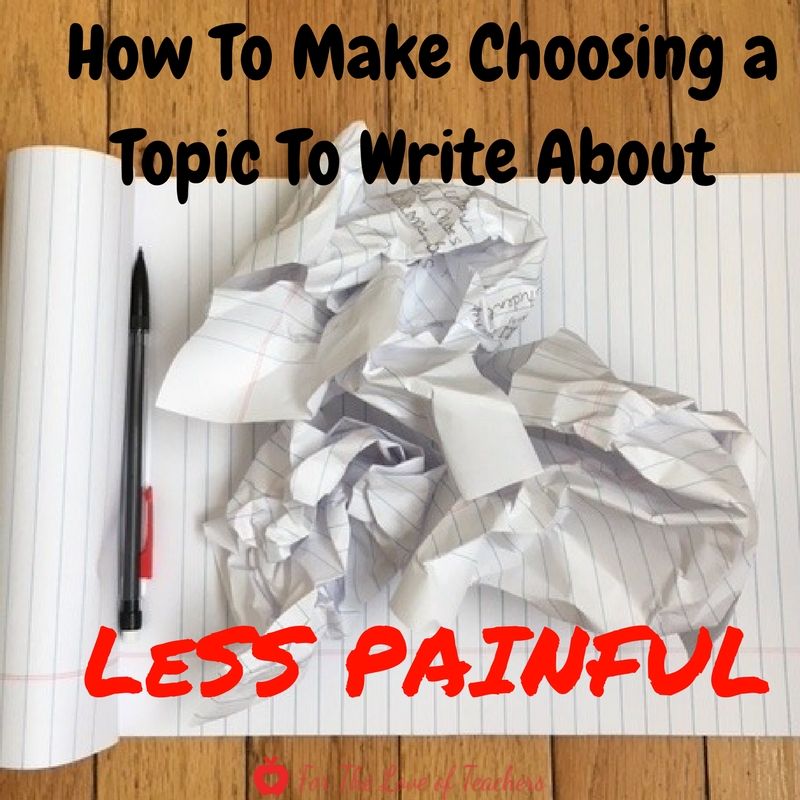I asked some teachers what challenges their students face most when it comes to writing and the response I received seems to be the most common among all grade levels— coming up with ideas for a topic. Makes sense, doesn’t it? You can’t begin the process of writing if you can’t think of a topic to write about. And what is more frustrating than not being able to come up with a topic to write about?? As I think back when I was in school, whether it was elementary, middle school, high school, or college, and I was given a writing prompt or essay question about a topic that I had no interest or background knowledge in, I started to panic, sweat and writer’s block immediately took over. I shut down and as a result, my writing piece was an unorganized piece of fluff and gibberish. Now give me a topic that I was interested in and passionate about and you would get a completely different writing piece showing off my voice and writing skills. So what if we gave students more choices and stopped telling them what to write about? Do you think it would make a difference? I decided to test it out with my elementary students.
Elementary students are just learning the basics of writing, its structure, and all the rules of punctuation, grammar, spelling, and more. They are trying to find their voice and to select and place details properly that are relevant to the topic. There is just so much to the writing process that is so overwhelming to young writers, as well as for older students and adults. I was lucky to get a paragraph (4-5 sentences) from second and third-grade students. Writing for some students was brutally painful. Some would cry and resist writing altogether, producing little to no writing during Writer’s Workshop each day. I wanted to change that. Throughout my teaching career, I began teaching what good writers do through the 6 traits within different genres of writing (narrative, persuasive, and informative) and using my own writing and mentor texts. I saw a HUGE difference in the way my students perceived writing and how they developed as writers by applying the skills, strategies, and techniques that real writers use.
Tip: DO NOT ALWAYS ASSIGN STUDENTS WHAT TO WRITE ABOUT. Let them choose. Allow students to write about more of what they are passionate about and are curious about. A student who delves deep into their interests and passions writes with voice and detail. Students who write about what they want do not hesitate to write. A writer who is curious about a topic reads like a writer to get more information about the topic to form opinions and arguments. Even when assigning writing prompts, give a choice of 3 prompts. Choice allows more freedom and flexibility often reducing anxiety and reluctance to write in general.
Steve Peha, the author of Be a Better Writer, shares an effective strategy called the Topic Equation Strategy: Interest + Subject = Topic(s) (Peha, p. 54), which is immediately useful to generate topics when you just have no choice in the topic. At some point or another we will all be faced with having to write about something that we don’t want to write about, but combining interest with the subject matter to come up with a topic that works for the writer is an effective approach to choosing a topic. Peha uses the example of students in a Social Studies class studying World War II, which I found to be the most interesting war in history, but others not so much. What does a teacher do when their assignment causes moaning and groaning among their students? Peha suggests creating a chart like this one.
|
Interest |
Subject |
Topic(s) |
| Sports | World War II | Athletes who served our country. Some of the greatest athletes of their day participated in WWII, like baseball stars Joe DiMaggio and Jackie Robinson, boxer Joe Louis, and Patty Berg, the greatest women’s professional golfer of her era. |
| Music | World War II | Music played a role in boosting Morale. It also kept Americans connected emotionally to war far from home. Famous musicians like Tony Bennett served in WWII. |
| Education | World War II | Women study things like complex mathematics that they had not been encouraged to study previously. Also, when WWII ended and the troops came home, the government created the GI Bill, which helped tens of thousands of returning soldiers get a college education. |
Be a Better Writer, Peha, p. 55
Great strategy, right?! It makes coming up with topics within subjects so simple. When using Topic Equation strategy (Peha, p. 54), students will be able to show what they know about the topic that was assigned. This allows the teacher to still have control over the course subject but gives students flexibility in choice within the subject based on their interests. It’s a win-win! I bet your wheels are turning now because no matter what grade or subject you teach, you could teach your students this equation and your students will be able to pick a topic based on what they know and what they are passionate about.
Check out Steve Peha’s Book: Be a Better Writer: For School, For Fun, For Anyone Ages 10-15 (The Be a Better Writer Series)
As a teacher and writer, I too find this strategy extremely helpful. When I think about what to write about I think about what I know, what I am passionate about, and my audience. So try it yourself and see how much less painful writing becomes for you and your students.
Need some more resources? My all-time favorite activity for generating ideas and topics for writing is the Writer’s Heart. I do a mini-lesson about what truly matters: special people, special memories, favorites, hopes, and dreams to generate meaningful and manageable topics to write about. There is no one you know better than yourself and who doesn’t love to talk or write about themselves? 😉 Students refer back to their Writer’s Heart at any time to generate ideas and topics for an autobiography, a memoir, a personal narrative, and more. Get this Writer’s Heart here.

In case you missed my FREE lessons, you can get them at the Shop: Teaching the Six Traits in Informational Writing- IDEAS here, Teaching the Six Traits in Narrative Writing- IDEAS here, and Teaching the Six Traits in Persuasive/Argument/Opinion Writing- IDEAS here.
Check out these writing bundles which include 18 lessons with a list of mentor texts in each genre:
Informational Writing
Narrative Writing
Persuasive/Argument/Opinion Writing
Entire Bundle of 54 lessons: Informational Writing, Narrative Writing, Persuasive/Argument/Opinion Writing
Or you can get many of my writing resources and tips in my Writer’s Workshop Boot Camp. You can see for yourself if the boot camp is right for you by reading about it here.
Be sure to visit For The Love of Teachers Shop for more resources to support your classroom and join For The Love of Teachers email list to receive the latest posts!
If you like it, then pin it!

Happy Writing!!


Christine Weis is a passionate educator, classroom management coach, wife, and mom of two busy boys. She enjoys teaching, writing, and creating resources for teachers.





this is so helpful! sometimes I get stuck in such a creative rut!
Thanks Tara! We all get into a creative rut sometimes. I hope these ideas help!! Thanks for reading!
Christine at For The Love of Teachers
Really like the idea of the Writer’s Heart. It’s important we show students how to mine their lives for topics. Writers need to know their personal lives are rich with topics to joyfully write about! When we’re writing personal narratives and writers are stuck, I ask them to think of a time when they were happy, sad, afraid, surprised, etc. Then they think of who they were with, what happened, and pair-up to tell their story aloud. I encourage them to focus in on a small, important moment within the larger event so they can add detail and meaning to the experience. We use a strategy I call “Thinking Boxes” to plan our writing by jotting simple notes–what happened leading up to the small moment, during, and after. Then we add details, dialogue, onomatopoeia, etc. to bring the writing to life. The more students tell the story aloud, the more details they come up with and they more able they are to write confidently when they put their story on paper. 🙂
Thank you for your thoughtful comment! I agree that our own lives are so rich with topics and ideas to write about, it’s just getting students to remember those details that make these stories come to life. Sounds like you teach “seed” moments too, narrow the big, watermelon topic and zoom in on one moment. 🙂 I love the strategy you call “thinking boxes,”…sounds like an effective graphic organizer to add the best of details. Excellent!! Thank you for sharing your great ideas with you and how they are applicable to your students. Thanks for reading!
Christine at For The Love of Teachers
Thank you so much for all these tips. I don’t have kids old enough to write yet, and I’m not a teacher but this is very helpful to my own writing.
Perfect! I’m glad these tips help any writer! 😉
Thanks for reading!
Christine at For The Love of Teachers
These are all great tips! It’s been a while since I’ve been in school, but these can still be applied to anyone! thanks for sharing!
Yes…these tips could be applied to anyone who writes…children, students, adults, etc. Hope it’s helpful! Thanks for reading!
Christine at For The Love of Teachers
Your approach for selecting a topic and writing more about it is so correct. Sometimes vast research helps gaining more knowledge and i absolutely love it.
Thank you! Researching a topic often gets students more interested in the topic as well as combining their own interests. That gets them writing for sure! Thanks for reading!
Christine at For The Love of Teachers
This is a great topic. As a teacher I’d love to share some points with my students.
Oh please do! Glad it was helpful! Thanks for reading!
Christine at For The Love of Teachers
So many great tips for getting young ones to write and I sort of agree on letting them choose a topic but I also feel that when they’re assigned one, then it also helps widen their knowledge of said topic. I know that’s what happens with me to this day. I’m in a bible study program and sometimes I’m assigned a part to research and present to the congregation. Not all topics are interesting to me, but I’ve found that once I start reading up on it, most often than not, things change and the subject quickly becomes something more to me. Of course with kiddos, it might not work as well at first though, lol 😉
Thank you Cori! I completely agree.. when we are not interested in a topic we research it and the topic hopefully becomes more interesting as we learn more about the topic. Giving students the strategies, techniques, the tools and the confidence to do this is the challenge. But they will get there and develop as writers with experience and knowledge. Thank you for sharing your experience and for your thoughtful comment. Thanks for reading!
Christine at For The Love of Teachers
This is a really good idea Christine. I’ll try this with my son. I’m trying to encourage him to write more. Writing was such an escape for me when I was younger. Helped me a lot.
My only worry though, is that I feel sometimes we should also challenge young writers to explore topics which make them uncomfortable or which they might not be passionate about, as it helps them develop some survival skills.
I was actually watching a clip related to this yesterday. I’ll try and find it and link it on here.
Modulargold.com
Thank you so much for your thoughtful comment! And I do agree with you. In life we will be faced with situations that involve writing that makes us uncomfortable. I think its our job as teachers to teach students strategies, techniques and give them the tools to help them through such a challenge. I love the idea of exploring topics. This will lead to unexpected interests, ideas and passions. Young writers need a lot of guidance, modeling and confidence building before they can write about uncomfortable topics well. I know if I had to write about an uncomfortable topic I would do a lot of research and try to make the topic more comfortable to write about. Please share the clip you watched. I bet it is so interesting and makes some excellent points. Thank you for reading! 🙂
Christine at For The Love of Teachers
I will have to share this with my nephew. He would get some great ideas for his next writing assignment for school. Thank you for sharing.
That’s a great idea! Thanks for reading and for sharing! 🙂
Christine at For The Love of Teachers
This would be great for bloggers too! I always find it difficult to find different topics! Thanks for sharing
Yes…definitely useful tips for bloggers, students and adults in many professions. Finding the right topics and writing about it well is always a challenge. Thanks for reading!
Christine at For The Love of Teachers
What a great way of making a topic that a child may find intimidating interesting and relevant to them! I wish they did this when I was in school.
Thank you Karrie! I agree! The whole idea is to get students writing and I find that if they write more about what they want to write about and what interests them, I get a lot of happy writers and in return, a happy Teacher!! Thanks for reading!
Christine at For The Love of Teachers
I wish i had this when I was a student.
Oh I hear ya! Me too! I remember writing after reading, writing prompts and the worst…essays!!! Thanks for reading!
Christine at For The Love of Teachers
Letting students chose their own topic is huge! They`ll be much more likely to actually engage in the project.
Absolutely…choice drives the passion to write freely and engaged students are less reluctant to write. Thanks for reading!
Christine at For The Love of Teachers
Love all of this! It’s so true! I always have seen especially the younger ones struggle with writing and topics. I gotta check this book out too! Thanks for posting this!! ❤️❤️
Thanks Ashley! I agree that the younger ones struggle but I know a lot of upper elementary, middle school, high school and even adults who still struggle coming up with writing ideas and topics. I struggle with it myself. Thank you for reading!
Btw, you’ll love the book Be a Better Writer 🙂
Christine at For The Love of Teachers